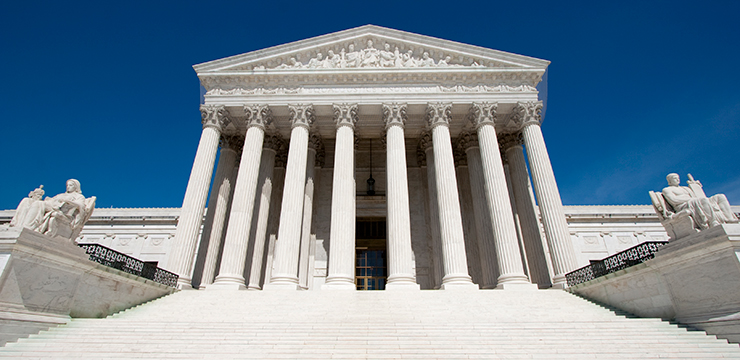Thomas M. Bondy
Senior Supreme Court Counsel
ワシントンD.C.オフィス
Tom Bondy is a Senior Counsel in Orrick’s Supreme Court & Appellate practice. He has had a distinguished career in government service at the Federal Bureau of Investigation and the Department of Justice.
As FBI Deputy General Counsel, Tom oversaw the Bureau’s nationwide civil litigation docket, including employment disputes, Freedom of Information Act cases, Constitutional tort suits, and an array of matters implicating law enforcement and national security equities. He supervised more than one hundred Office of General Counsel personnel, and advised the FBI’s Director, Deputy Director and other executive management officials regarding especially sensitive litigation issues.
Prior to serving at the FBI, Tom spent 25 years with the Department of Justice, Civil Division, Appellate Staff, as an appellate litigator and supervisor. In that capacity, he oversaw the court of appeals and Supreme Court work of the Appellate staff’s attorneys across the full range of U.S. government subject areas, including Constitutional issues, anti-terrorism and national security, Federal Tort Claims Act, False Claims Act, Bivens, personnel and federal labor relations, Freedom of Information Act, administrative law, attorney fees, and government benefits. Tom personally briefed and orally argued more than one hundred cases in all of the federal courts of appeals and several state appellate courts, and drafted dozens of U.S. Supreme Court merits briefs, amicus briefs, certiorari petitions, and oppositions to certiorari petitions. One of the principal architects of the Justice Department’s litigation strategy in high-stakes appeals, Tom was considered one of the agency’s go-to advocates.
Tom received the Justice Department’s John Marshall Award for outstanding appellate advocacy, as well as the Attorney General’s Award for furthering the interests of U.S. national security. He has served as an instructor at the Attorney General’s Advocacy Institute and is also an Adjunct Professor at American University’s Washington College of Law.
Before joining DOJ, Tom clerked for then-Judge (now retired U.S. Supreme Court Justice) Anthony Kennedy on the U.S. Court of Appeals for the Ninth Circuit.
-
Since joining Orrick, clients have included RBS Securities, Detroit Free Press and Gannett Publishing, Los Angeles and Alameda Counties, the Immigrant Defense Project, and the City of Memphis. Representative engagements include:
- County of Los Angeles v. Mendez (U.S. Supreme Court): Represented the County of Los Angeles in an excessive force case raising the validity of the “provocation rule,” which held law enforcement officers personally liable for a reasonable use of force if there was an earlier constitutional violation. Secured a unanimous, 8-0 victory vacating the Ninth Circuit’s “provocation rule.”
- Sessions v. Dimaya (U.S. Supreme Court): Represent Mr. Dimaya in a case that will affect the immigration status of thousands of immigrants. At issue is whether a federal criminal and immigration law that can be used as a basis for deporting immigrants is unconstitutionally vague.
- Teixeira v. County of Alameda (Ninth Circuit) (en banc): Represent the County in a high-profile Second Amendment case involving local zoning of gun stores. The case is being closely watched by local and state governments across the United States, as well as the gun industry. The court’s decision will affect what types of constitutional challenges can be brought against regulations on gun sales, and what leeway local governments have to ensure public safety.
Representative engagements prior to joining Orrick included:
- Clapper v. Amnesty Int’l USA (U.S. Supreme Court): Successful defense of Foreign Intelligence Surveillance Act provision regarding surveillance of non-U.S. persons abroad.
- FCC v. FOX Television Stations, Inc. (U.S. Supreme Court): Successful defense of FCC’s indecency regulations.
- United States v. Bean (U.S. Supreme Court): Successful defense of Congressional appropriations provision limiting restoration of felons’ gun rights.
- Equity in Athletics, Inc. v. DOE (U.S. Supreme Court): Successful opposition to certiorari petition asserting procedural and substantive challenge to Department of Education policies on equal gender opportunity in athletics.
- Cobell v. Salazar (D.C. Circuit): Successful defense of $3.4 billion class-action settlement of Indian trust fund claims.
- In re NSA Telecom Litigation (Ninth Circuit): Successful defense of Act of Congress immunizing telecom companies allegedly assisting in government surveillance.
- Wilner v. NSA (Second Circuit): Successful defense of “Glomar” doctrine under the Freedom of Information Act.
U.S. Supreme Court to Decide Major Employment-Discrimination Issue on the Scope of Title VII
2 minute read | October.12.2023

Orrick Amicus Efforts Back Racial Diversity in College Admissions in U.S. Supreme Court Case
1 minute read | August.02.2022
